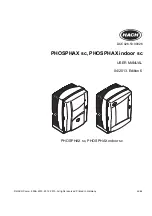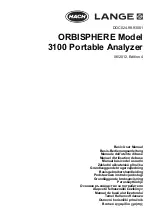
Hysteresis
The hysteresis parameter controls the re-energising of the relay after it has tripped, see
Fig.7.1 and 7.2. It is expressed as a level or volume and is entered at V1H2 for relay 1
or V5H2 for relay 2:
Step Matrix Entry Significance
1
V1H2
e.g. 400
Sets hysteresis for relay 1
(in our example relay switches on again at 200+400 =600)
2
-
»E«
Register entry
Relay at fault
When the self-monitoring circuit triggers on a fault, the relay adopts the behaviour set at
V1H3 for relay 1 and V5H3 for relay 2:
•
Setting 0 =
de-energised
•
Setting 1 =
as assigned output 1 or 2, i.e. -10%, +110% or hold
depending on entry at V0H7 or V4H7.
Step Matrix Entry Significance
1
V1H3
e.g. 0
The relay de-energises when the self-monitoring circuit
triggers.
2
-
»E«
Register entry
When option 1 is entered, the relay assumes the status dictated by the analog signal.
Table 7.3 summarizes the possibilities
7.2
Relay operating modes
Depending on the hysteresis settings, several operating modes are possible:
•
as a limit switch
•
as a two-point control with one relay (Fig. 7.1, 7.2)
•
as a two-point control with two relays (Fig. 7.3)
Limit switch
If the relay is to act as a limit switch only:
•
Set the hysteresis at V1H3 or V5H3 low or to 0
The relay trips when the level of volume drops below or rises above the set pressure.
When the level or volume returns to normal, the relay energises immediately.
Step Matrix Entry Significance
1
V1H0
e.g. 10
Switch point 1 = 10
2
-
»E«
Registers entry
3
V1H1
0
Minimum fail-safe mode
4
-
»E«
Registers entry
5
V1H2
e.g. 10
Hysteresis = 10, the relay energises again at level = 20
6
-
»E«
Registers entry
Setting at V0H7/V4H7
Minimum fail-safe mode
Maximum fail-safe mode
0 = -10% (-2 mA)
Relay de-energises
Relay energises
1 = +110% (+22mA)
Relay energises
Relay de-energises
2 = hold (last value)
No change
No change
Table 7.3:
Relay response on fault
condition.
Silometer FMC 672 Z/677 Z
Chapter 7: Limit Switches
38
















































